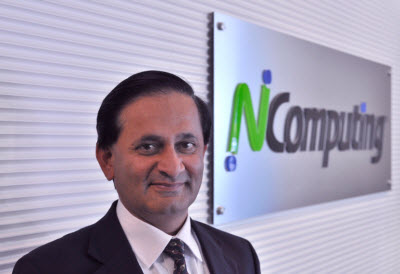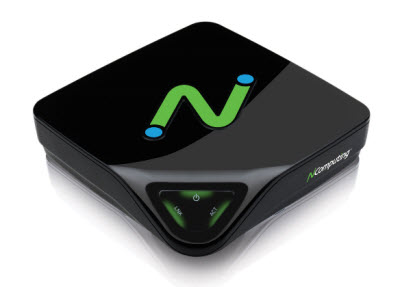 Desktop virtualization firm NComputing has named former Citrix executive Raj Dhingra as its new chief executive to replace founding CEO Stephen Dukker.
Desktop virtualization firm NComputing has named former Citrix executive Raj Dhingra as its new chief executive to replace founding CEO Stephen Dukker.
Redwood, Calif.-based NComputing is on a mission to turn computing upside down by replacing full-blown PCs with lightweight clients that share a single computer. It’s like a return to the old time-sharing of dumb terminals connected to mainframe computers, only different because it makes a lot more economic sense by bringing down the cost of operating a PC.
 NComputing’s virtualization software allows several client machines — nothing more than monitors, keyboards and memory hubs — to share the computing power of a single PC. That way, one PC can deliver computing power to 10 or so users for lightweight purposes such as browsing the web or sending email. This set up works well in schools, emerging countries, big task-focused corporations and in retail. Dukker, who will remain co-chairman, helped get the company off the ground the last five years.
NComputing’s virtualization software allows several client machines — nothing more than monitors, keyboards and memory hubs — to share the computing power of a single PC. That way, one PC can deliver computing power to 10 or so users for lightweight purposes such as browsing the web or sending email. This set up works well in schools, emerging countries, big task-focused corporations and in retail. Dukker, who will remain co-chairman, helped get the company off the ground the last five years.
NComputing has shipped more than 2.6 million client units to date, and its products have proven to be disruptive. They’re used by more than 20 million daily users. The company’s products have redefined what a PC is.
 Dhingra is the former general manager and group vice president of the desktop virtualization business at Citrix. He said in an interview that he will help NComputing grow into the education and enterprise markets.
Dhingra is the former general manager and group vice president of the desktop virtualization business at Citrix. He said in an interview that he will help NComputing grow into the education and enterprise markets.
At Citrix, Dhingra, a 20-year veteran of the tech industry, helped grow the desktop virtualization business to close to $500 million in sales over three years. He said that his goal is to initiate the same leap forward in sales growth at NComputing.
NComputing has done very well grabbing market share in the thin client business, although the exact share depends on how you define thin clients. Other thin clients often have no computing power at the client level and rely entirely on computing power stored in a web-connected data center. NComputing’s designs involve connecting a bunch of mostly dumb-clients to a single smart PC. IDC believes that NComputing is ranked third in thin clients behind Hewlett-Packard and Wyse.
The overall market for desktop virtualization is getting bigger, with Gartner projecting that 15 percent of the business desktop market will be hosted on virtual desktops by 2014. That amounts to a market of 74 million clients in the business market alone.
Virtualization is a threat to the traditional desktop based on the Wintel duopoly of Microsoft and Intel. But by lowering the cost of computers by 50 percent and cutting the power usage dramatically as well, NComputing believes it can make desktop computing available to a much wider audience around the world.
“We believe the traditional PC replacement market is just the tip of the iceberg for virtual desktops, whose market potential is 10-100x larger,” Dhingra said.
In markets such as India, NComputing has run its own virtualization software on its networks of machines. Windows applications could run across those networks, with each user accessing an app on the central computer. But in businesses, NComputing may begin to work more with other vendors such as Citrix, Microsoft, and VMware, which have all created popular virtualization software for companies. NComputing already has strategic partnerships with computer makers such as LG, Fujitsu and Panasonic.
IDC says that NComputing ranks No. 1 in Asia-Pacific and Latin America in the category of enterprise clients and has more than 12 percent of the K-12 education desktop market in the U.S. Customers are in 140 countries and some have ordered more than 150,000 clients.
VentureBeat's mission is to be a digital town square for technical decision-makers to gain knowledge about transformative enterprise technology and transact. Learn More
